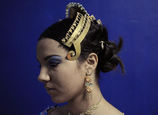
 |
| (File photo) |
My wife's pregnancy gave us a chance to test out the truth and falsehood of many traditional Chinese methods of telling the gender of an unborn baby. The myths and old wives' tales were almost as fascinating as a Harry Porter movie.
If we were not in China, it would not have been a problem. A health check will satisfy our curiosity.
But the Chinese mainland has long banned gender tests in hospitals, for fear that couples might choose abortion if they find out the baby is going to be a girl.
My wife tried to ask her B-scan ultrasonic doctor about the gender of our baby. The doctor smiled and only said the baby was fine.
We reckon that if the doctor had revealed the gender, she and the hospital might get into trouble. The doctor can be fined, and the hospital disqualified.
A friend offered to use his guanxi or relationship with the hospital to find out. But in the end, we decided to keep the suspense until the last minute. My wife and I were fine with either a boy or a girl, although we both hoped it would be a son.
Traditionally, Chinese people have preferred having sons, especially during the agricultural era because sons can do the work. But with urbanization, that has changed dramatically.
Women are now economically independent, and can support their parents as much as men. Chinese parents can easily marry off their daughters without as much dowry as before, while many parents need to finance their sons to buy an apartment as a wedding gift so that they can settle down in a big city.
Thus originates the term "merchant's bank" for a newborn girl, because she will bring in a husband's help; and "construction bank" for a boy because parents will need to save up to buy him a house.



















![]()
